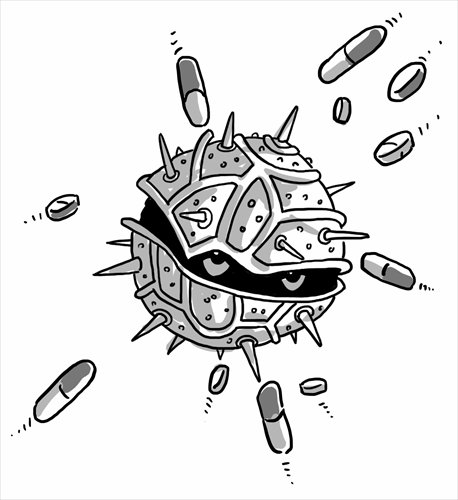Antibiotic abuse means age of medical miracles may be short-lived

Illustration: Liu Rui/GT
Antibiotics are a daily miracle, but one we dangerously take for granted.
Before Alexander Fleming's discovery of penicillin in 1928, and the medical revolution it sparked, even a simple cut, if infected, could often prove fatal. Hundreds of conditions now easily eliminated with a trip to the doctor were potentially life-threatening. But this miracle is one that we're endangering with our own recklessness and laziness.
Researchers are engaged in a constant battle against evolution. As we target bacteria with ever more-powerful antibiotics, those bacteria that survive pass their resistance on and spread further.
This results in new strains immune or resistant to existing treatments, driving us back to the days before Fleming's miraculous finding. For now, we've managed to keep one step ahead of evolution, but researchers fear that we may be pushing the limits of possible new treatments.
One of the main causes of this is the abuse of antibiotics. With every unnecessary treatment given, the chance of breeding and passing on resistant strains of bacteria increases.
China is one of the worst offenders in the unnecessary taking of antibiotics. To begin with, drugs that in most developed countries are given only by prescription are sold over the counter in pharmacies.
With medical knowledge poor and many people unaware, for instance, of the differences between viral infections and bacterial ones, antibiotics are seen as a panacea for common ailments.
In addition, traditional Chinese medical treatments, according to studies by the British Medical Council, disgracefully often contain unlabelled antibiotics alongside the "herbal" remedies promised.
According to Time magazine, China prescribes 10 times the amount of antibiotics that the US, considered a frontrunner in antibiotic abuse among developed countries, does.
Over 70 percent of inpatients in hospitals receive antibiotics, against a global standard of a recommended maximum of 30 percent.
Much of this stems from poor training and medical ignorance on the part of patients. But there is also a powerful institutional reason.
Since Chinese hospitals' main revenue stream depends upon the sale of pharmaceuticals, doctors are often encouraged to overprescribe in order to drain patients' wallets.
This rampant abuse helps breed new superbugs. But it's not just human treatments that are to blame. Over 50 percent of China's antibiotics now go to livestock.
For not entirely understood reasons, giving antibiotics to animals in early life makes them grow larger and stronger. Regular doses of antibiotics can also help prevent diseases that cull herds and cut into farming profits. So it's very tempting, especially in China's increasingly industrialized agricultural sector, to pump animals full of antibiotics.
But antibiotic-resistant bacteria bred among farm animals can all too easily cross to humans.
Constantly dosing animals thus leaves humanity at even more of a disadvantage in the race against evolution.
In this, China is following the unfortunate lead of the US, where over 70 percent of antibiotics go to livestock.
In Europe, government regulations have been introduced in many countries since the early 2000s to restrict the use of antibiotics for livestock, although more needs to be done. But the power of the agribusiness lobby in US politics is such that similar measures have inevitably been killed by business-backed politicians.
Health and science authorities in both China and the US have warned about the perils of over-prescription. China's Ministry of Health issued strong warnings early last year against antibiotic abuse.
But unless tough measures are taken soon, the age of antibiotics may draw to an end without even making its centennial.
The author is an editor with the Global Times. jamespalmer@globaltimes.com.cn